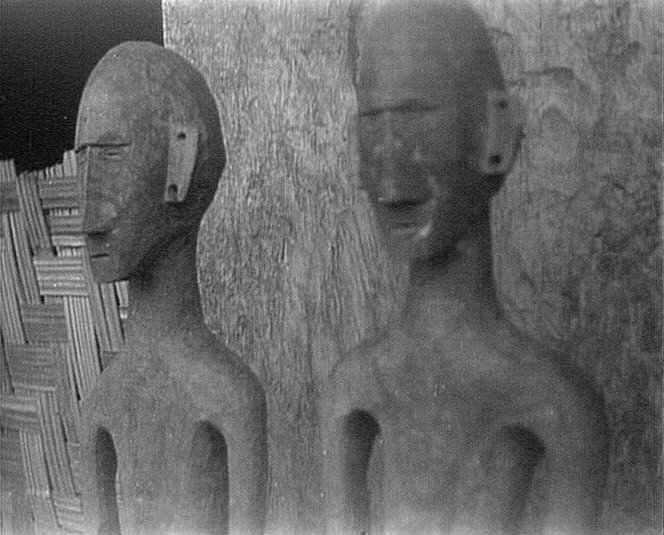Once upon a time there was a rich couple who had only one child, a boy named Akhangsuong. Every time they went to the fields the child ran after them and cried and wanted to be taken too. Every time this happened they called the young men to catch him and take him back and keep him until after they had gone, but one day after the young men had let him go he ran off a second time and met with some strangers who carried him off and sold him as a slave in a distant village. When his parents came home in the evening and asked the young men where the boy was, they answered that they had taken him back and then let him go, as before; but though his parents searched and searched, there was no trace to be found of him, for the strangers had taken him and sold him to a couple who lived twelve villages away.
This couple had a daughter of their own and another slave-boy, younger than Akhangsuong, named Chellet. When Akhangsuong grew up, he and the girl fell in love and slept together, and one morning they rose so late that there was no wood cut or water carried when the old couple appeared. Akhangsuong was ashamed and said so to the girl, but she answered: “We are in love – what is there to be ashamed about?” and when her parents asked why nothing had been done, she answered that she had overslept.
Akhangsuong was now a young man, and no one could surpass him at any sport. One day the dekachang arranged to go on a dancing tour to another village, but the old couple forbade the two young men to eat in strangers’ houses when they went on this trip, and killed a pig and gave them plenty of provisions for the journey. The two went off together with it all, and since Chellet was by courtesy Akhangsuong’s younger brother, he carried the load.
The first night in the strange village was spent in singing and feasting, and the next morning the young men went and jumped at the hazoa. Akhangsuong leaped further than any of them, and shouted out his name in triumph. The villagers asked Akhangsuong’s companions who he was and who his parents were, but they answered that he was a slave. Chellet overheard this and told Akhangsuong, who was hurt and ashamed and refused to take any more part in the sports, and later on he and Chellet would not go into one of their hosts’ houses to eat, but sat down to take their meal at the place in the street where the young men had been putting the stone. Seeing this, one of the village women – who was Akhangsuong’s father’s sister, although he did not know it – called to them not to eat in the dirt and smells of the street, but to come and have their meal in her house. At first they were unwilling, but after talking it over, they decided that it was not right to eat in public in the street and went into the house. The woman had known Akhangsuong as a child and had heard him shout his name when he jumped, and on looking at him closely she saw a scar on his forehead where he had had a cut from a stone as a boy. She brought out zu and insisted that they must have some as part of her village’s hospitality, but Chellet, after drinking a little, hurried away. Akhangsuong would have done the same, but she caught him by the cloth and asked if he were not Akhangsuong. When he said that he was, she took him out and showed him his father’s house in the distance and told him that his father was so rich that the house was full of his mithans’ dung. “In ten days’ time you must come back here,” she said. “You must run away from your owner and come here, and I will send you back to your parents.”
When Akhangsuong reached his owner’s house again he was silent and thoughtful and never said a word when he came to the house for meals, and the old couple asked Chellet what was the matter. He told them that when Akhangsuong had been leaping at the hazoa in the other village and the villagers asked who he was, his companions had said he was a slave, and that he was unhappy about that. The old couple were so angry when they heard this that they went to the dekachang crying: “Who has done this to our son?” and broke up all the sleeping benches and machans with axes.
When a week or so had gone by Akhangsuong began to make ready to go, and taking off all the necklaces and armlets his owners had given him, he slipped out of the house, but did not go far. When the girl saw what had happened she began to weep and lament and ask why he wanted to leave, and hearing this, he came back and told her that he was only joking. She did not believe him, and wherever he went she wanted to go to, whether to fetch wood or to bathe. At last it was time for him to go, and hardening his heart, he ran away to his aunt’s house, and she sent him on to his father’s village. When he reached it night had fallen and the young men and girls were dancing in the dekachang of which his father was head. He knocked at the back door and his mother called out: “Who’s there?” “Your son,” he said, and she let him in. Then she went and called his father, who was in the dekachang praising and encouraging the dancers, and told him who had come. Hearing this, he told the dancers: “Don’t dance any more – your mother has a stomach-ache.” The dancers wondered what had happened to stop the dancing all of a sudden, and were sure that some stranger had come, and the girls went and peeped in through the cracks of the house-wall and they all thought they had never seen anyone so handsome as Akhangsuong.
When the old couple found that Akhangsuong was missing they sent Chellet out to search for him, and off he went with a load of food and went wandering through village after village looking for him. At last he came to where he was, and Akhangsuong saw him and said: “Ah, my younger brother has come!” Chellet said: “Oh, my elder brother, what trouble you’ve given me! I have searched village after village for you!”
After he had been well entertained in Akhangsuong’s house he went back and told the old couple where he had found him, and since Akhangsuong’s parents would not let him go back to the old couple’s village, and they would not let their daughter go to Akhangsuong’s village, the two married and settled in a village midway between the two and there lived happily for many years, and were very rich.
Ursula Graham’s Collection







